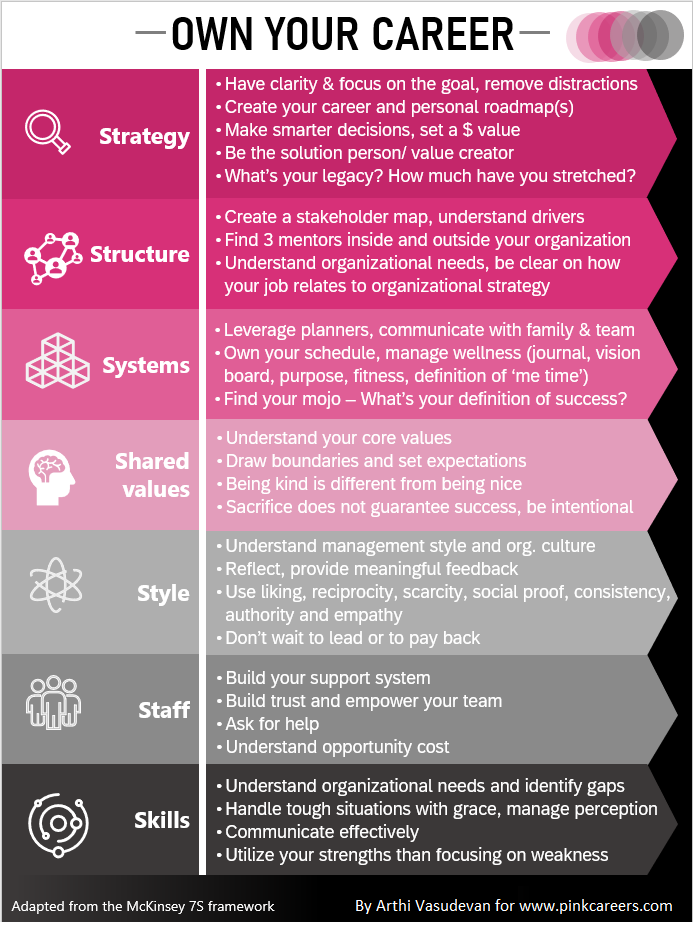7 Steps to Successfully
Owning Your Career
Personal branding is an often-understated phenomenon, mainly because talking about the self is seen as arrogant in some of our cultures. I have observed that it is not uncommon for women to particularly feel uncomfortable in highlighting their accomplishments. After having multiple conversations over the years with mentors and trying to find sponsors (those angel unicorn investors you wonder if they really exist?), trying, testing, and failing in a few different ways of networking, below is an infographic I created to compile my thoughts on owning your career. As a product manager dealing with launching new products to market and defining strategy, I loved the idea of using the
7S McKinsey framework for career growth.
Every P&L leader knows that in order to reach a revenue goal, a target needs to be set and clearly communicated to key stakeholders. Similarly, take the time to create your 5-year career roadmap with example job titles, listing your areas of interest in each position.
Next, discuss your roadmap with your manager, N+1, and HR leader, identify the gaps between your current role and desired state, ask for which areas you need to grow and which stretch roles you can take to accelerate your career. When you ask for help, people want to help, and intentionally or unintentionally, some of your mentors automatically get vested in your career to become your sponsor someday.
I maintain an Excel sheet with the names of key stakeholders I work with. I keep a note of what drives them, something important to them, and their success. As my Teams professor, Jonathan Miles from Rice University, rightly said, try to find at least three mentors inside (in different functions) and outside your organization. These are your ‘board of directors’ and make sure to stay in touch, even better offer to help them in some way.
A few habits that have helped me in recent years for
career growth, work-life integration, and fulfillment are:
1. Finding peer mentors who are going through similar struggles and can share valuable tips and tricks.
2. Sharing and discussing leadership learnings with my partner (leadership growth as a couple and family).
3. Explaining to kids why mommy values her ambition as much as she cherishes time with them.
4. Relying on my support system of mentors, helpers, planners, and most importantly.
5. Growing people as I grow, i.e. helping with resume reviews, sharing meaningful feedback around their performance, how your mentees show up in meetings, and how they are perceived as leaders (and seeking similar feedback).
I use my gratitude journal to reconnect with my core and remind myself of values that are important to me, every day (well, almost). If taking an hour for lunch is important to you, and you work in a global team, accommodating multiple time zones, then block your calendar. Set clear expectations with your team on preferred working times and modes of communication (explicitly say it because we’re only as good as we communicate). These actions have helped me build trust with my team. Also, if you notice someone working late, or is struggling, offer support.
Similarly, if you see someone taking extra efforts to make that customer presentation look sharper, tell them, preferably in front of a larger team. The simple act of remembering and asking about my team’s family alone has a gone a long way in influencing.
Do you know what is important for your manager to succeed? Do they care only for top-line and bottom-line results, or could you successfully deliver through the team? If you do not know the answers to these questions, ask!
I love Jack Welsch’s reference to the “generosity gene” for a leadership trait. Aligning my actions to reflect a positive leadership style, like sharing resources and not guarding them, empowering the team to make decisions, asking about colleagues’ families, recognizing effort even if the end result was not perfect, have helped project confidence.
I also love this TED talk where Peter Sage says, “People will never rise above the opinion of themselves.” Reflect on what it would take for you to project that confidence so that others can see that too!
Ask for help and delegate! The only way my husband and I have learned to survive (let alone thrive) in our dual and demanding careers and family is to take as much help for those activities that don’t necessarily need us.
For example, buying home-cooked food from a neighbor, paying for a mother’s helper (soon will be called parents’ helper?) for folding kids’ laundry, and cleaning the house have freed me and my husband to spend meaningful time with each other and with our kids. If you struggle to self-justify the costs, calculate your worth for an hour (cost of a dish from a restaurant + cost of paying for cleaning for 30 minutes = your opportunity cost for an hour).
Like a dutiful MBA graduate, I did a SWOT analysis on myself and had a conversation with my manager to understand my growth areas and opportunities. This activity helped me with alignment and better connection with my manager.
A mentor once told me “people notice how you handle pressure and how you respond in conflicting situations.” That was an eye-opener to practice active listening to truly understand what the other person/ team member is trying to say, remove subjectivity and try to stay objective, and mainly embrace the mindset of ‘the real problem vs. team’ compared to your ‘problem vs. my problem’.
I also learned that effective communication, regardless of your accent or diction, is key. Senior leadership prefers little to no surprises-both good and bad. Like the aviation gurus say – aviate, navigate and communicate!
So I ask you..., Are you ready to harness the secret ingredient of success (You) to advance your career?
What action are you going to take to own your career?
Drag to resize
Arthi Vasudevan leads the cybersecurity product line at Nexus Controls, a Baker Hughes business, laying the technical and commercial strategy to provide cybersecurity solutions to industrial customers in their digital transformation journey. Over the last 13 years, she has led several impactful projects in mining, marine and energy industries in the areas of electrical and control system design, new product development, project management, Lean Six Sigma, cost-out and lifecycle management.
Arthi holds Bachelor’s and Master’s degrees in Electrical Engineering (EE), and an MBA from Rice University. She is passionate about, and has led multiple initiatives in women empowerment, professional development, promoting STEM in students, diversity and inclusion within Baker Hughes and outside with non-profit organizations.
Drag to resize





